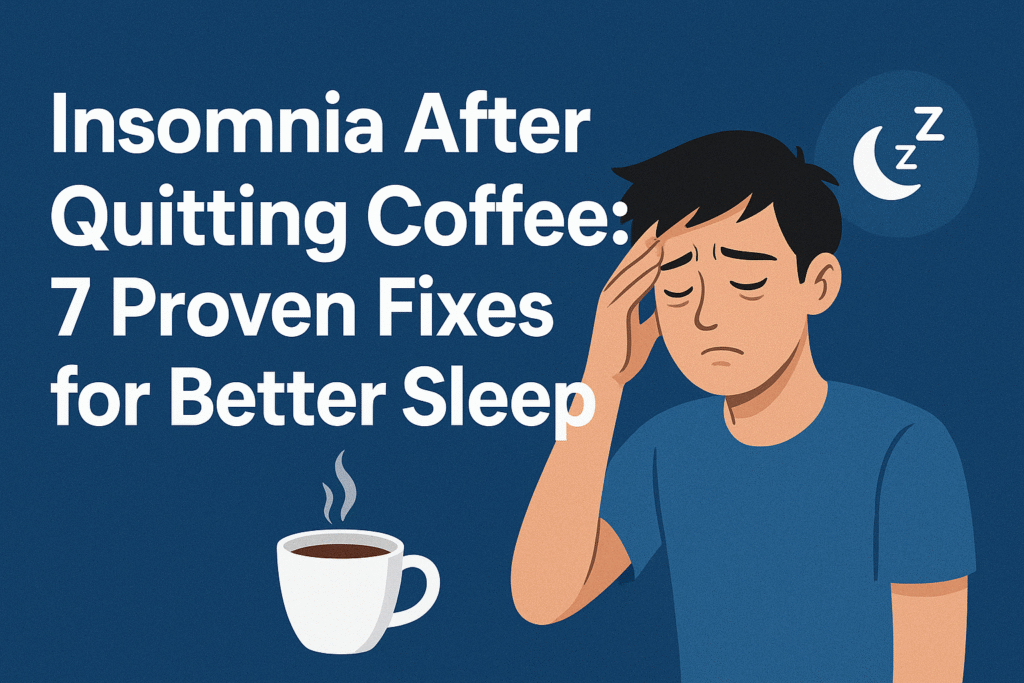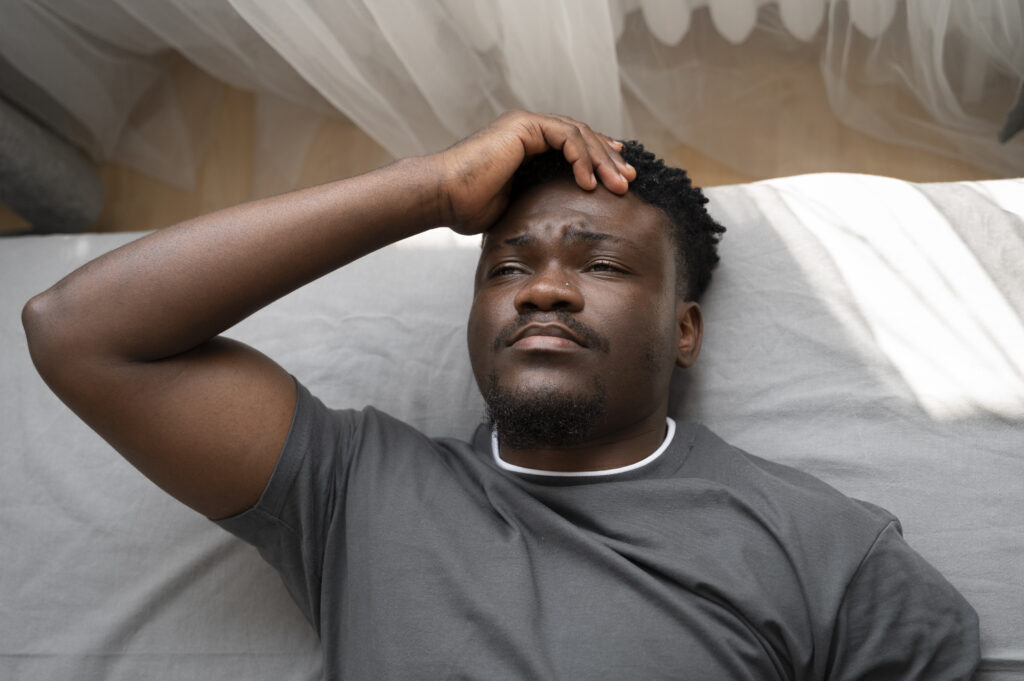
⚠️ Affiliate Disclaimer: This post may contain affiliate links, which means I may earn a small commission — at no extra cost to you — if you make a purchase through one of these links. I only recommend products or services I genuinely trust and believe can provide value. Thank you for supporting My Medical Muse!
Insomnia After Quitting Coffee: 7 Proven Fixes for Better Sleep
Insomnia After Quitting Coffee: How Long It Lasts
Coffee isn’t just a drink, it’s a global ritual, a trusted productivity booster, and, for many, an essential part of daily life. Every single day, more than 2.25 billion cups of coffee are consumed worldwide, from that first energizing sip in the morning, to the mid-afternoon pick-me-up, to the late-night study companion, coffee has become woven into our routines and identities.
But what happens when you decide to give it up? Most people brace themselves for the classic withdrawal symptoms like pounding headaches, fatigue, irritability, and a dip in focus. Yet, one of the most surprising side effects often catches people off guard, insomnia.
It sounds paradoxical. After all, caffeine is a stimulant that keeps you awake and alert. Logic suggests that cutting it out should improve your sleep. Instead, many former coffee drinkers report restless nights, frequent wake-ups, or an inability to fall asleep at all. This confusing twist leads many to wonder, why is my sleep worse without coffee?
The answer lies in the complex way caffeine interacts with the brain, quitting coffee disrupts the delicate balance of neurotransmitters, particularly adenosine and dopamine, which play a central role in regulating sleep. The brain, temporarily out of sync, struggles to recalibrate, leaving you tossing and turning when you expected to finally rest deeply.
In this guide, we’ll explore:
- Why insomnia happens after quitting coffee
- How long it typically lasts
- The key factors that influence recovery time
- Proven, practical strategies to help you sleep soundly again
If you’ve recently stopped drinking coffee or are planning to and find yourself wide awake at night, this article will give you clarity, reassurance, and actionable solutions.
The Science of Caffeine Withdrawal
When you quit coffee, your brain and body go through a period of adjustment. Caffeine isn’t just a casual stimulan, it interacts deeply with your nervous system. Here’s what happens:
- Adenosine Rebound
Normally, caffeine blocks adenosine (the “sleep pressure” chemical). Once you quit, adenosine floods back in, making you feel overwhelmingly tired during the day but paradoxically restless at night. - Dopamine Drop
Caffeine boosts dopamine activity, which is why coffee feels motivating and mood-lifting without it, dopamine dips temporarily, leading to fatigue, brain fog, and sometimes irritability. - Cortisol Fluctuations
Caffeine stimulates cortisol (the stress hormone). When you quit, cortisol rhythms may swing unpredictably, causing feelings of being “tired but wired.”
Together, these shifts create the withdrawal experience, headaches, mood swings, low energy, and yes, insomnia.
Benefits of Quitting Coffee for Sleep & Health
It’s easy to focus on the discomfort of withdrawal, but pushing through has powerful long-term rewards:
- Deeper Sleep: Without caffeine disrupting slow-wave and REM cycles, your sleep becomes more restorative.
- Natural Energy Rhythms: Your body resets its circadian rhythm, making energy peaks and dips more stable throughout the day.
- Reduced Anxiety: Cutting caffeine lowers stress hormone spikes, easing feelings of jitteriness or nervousness.
- Better Mood Balance: Once dopamine normalizes, mood swings and caffeine crashes fade.
- Improved Hydration: Less caffeine means less diuretic effect, supporting hydration and skin health.
- Digestive Relief: For some, reducing coffee eases acid reflux, stomach irritation, and gut discomfort.
Many people discover that life after coffee feels calmer, steadier, and more balanced than they expected.
How Caffeine Affects Sleep
To understand why quitting coffee can trigger insomnia, it helps to first examine how caffeine influences the brain and body. Caffeine is more than just a quick energy boost, it alters fundamental sleep-regulating processes.
The Role of Adenosine
One of the key players in sleep regulation is adenosine, a neurotransmitter that gradually builds up in your brain throughout the day. The higher your adenosine levels climb, the stronger your “sleep pressure” becomes, essentially the brain’s way of telling the body it’s time to rest.
When you finally sleep, adenosine levels decline, allowing you to wake up refreshed and reset.
Caffeine interferes with this natural rhythm by blocking adenosine receptors. Instead of receiving signals that it’s tired, your brain gets tricked into feeling alert and awake. The fatigue hasn’t disappeared, it’s just been masked. This is why, once caffeine wears off, the “crash” can feel so intense.
Half-Life and Timing Matters
Caffeine stays in the body far longer than most people realize. Its half-life (the time it takes for your body to metabolize and eliminate half of the dose), is typically 4 to 6 hours. This means that if you drink a large coffee at 4 p.m., a significant amount of caffeine may still be in your system at 10 p.m.
For sensitive individuals, caffeine’s effects can last 8 to 12 hours, silently interfering with the ability to fall asleep or stay asleep. Even if you do manage to drift off, caffeine can:
- Reduce deep sleep (slow-wave sleep)
- Shorten REM cycles (important for memory and mood)
- Increase nighttime awakenings
The result? You wake feeling unrefreshed, even after a “full night” of sleep.
Chronic Impact on Sleep
For regular coffee drinkers, daily caffeine intake can lead to long-term sleep disruptions. Research shows that consistent use can:
- Delay sleep onset (making it harder to fall asleep)
- Reduce total sleep duration
- Decrease restorative deep sleep
- Cause lighter, more fragmented sleep
Over time, the brain adapts by upregulating adenosine receptors, essentially building more of them to try to restore balance. This adaptation is one reason tolerance develops, making you need more caffeine to feel the same energizing effect.
But it also explains why, when you quit coffee, withdrawal hits so hard. Suddenly, there’s no caffeine blocking all those extra adenosine receptors, so fatigue and disrupted sleep flood in until your system recalibrates.
What Happens When You Quit Coffee?
When you stop drinking coffee, your body begins a period of recalibration. Caffeine has been masking fatigue, altering brain chemistry, and influencing hormone levels for as long as you’ve been consuming it. Once it’s removed, the nervous system scrambles to find balance again.
Without caffeine:
- Adenosine floods receptors that were previously blocked, making you feel overwhelmingly tired.
- Dopamine activity decreases, which can lower mood and motivation.
- Stress hormones fluctuate, creating irritability and restlessness.
This sudden neurochemical shift is what drives caffeine withdrawal, often peaking within 24-72 hours after your last cup.
Common withdrawal symptoms include:
- Headaches
- Fatigue and low energy
- Irritability or mood swings
- Anxiety or jitteriness
- Brain fog and poor concentration
- Insomnia (difficulty falling or staying asleep)
Why Does Insomnia Happen After Quitting Coffee?
At first glance, it seems contradictory, you’d expect giving up caffeine to improve sleep, not disrupt it. But insomnia is one of the most common withdrawal symptoms, and the reason lies in temporary neurochemical and hormonal imbalance.
- Rebound Neurotransmitters
After quitting, the adenosine and dopamine systems swing out of balance, with excess adenosine activity and reduced dopamine signaling, your brain may feel drowsy by day but restless at night. - Hormonal Stress Response
Cortisol, the body’s primary stress hormone, may spike during withdrawal. This creates the frustrating state of feeling “tired but wired,” where your body craves rest but your nervous system won’t let you relax. - Withdrawal Anxiety
The irritability and low mood triggered by caffeine withdrawal can fuel mental restlessness. Racing thoughts or anxious feelings can make it harder to unwind before bed. - Circadian Rhythm Disruption
If you relied on coffee to dictate your daily energy rhythm, morning wakefulness, afternoon focus, or late-night studying, your body clock must now reset itself. This adjustment phase can temporarily throw off your natural sleep-wake cycle.
How Long Does Insomnia Last After Quitting Coffee?
The duration of insomnia depends largely on your caffeine dependence (amount, frequency, and duration of use), as well as your unique sensitivity. Most people experience sleep issues for only a short period before the body adjusts.
- Day 1-2
Withdrawal begins within 12-24 hours of your last cup. Restlessness, fragmented sleep, and even unusually vivid dreams may appear. - Day 3-7
Symptoms peak. This is when insomnia is typically most severe, falling asleep feels difficult, and nighttime awakenings are common. - Week 2-3
Brain chemistry starts to stabilize. Sleep begins to improve, though it may still feel light or fragmented. - Week 4 and Beyond
For most people, sleep returns to normal. Many even report deeper, more restorative rest than before they quit coffee.
Heavy Coffee Drinkers (Long-Term Users)
If you consumed 5-8 cups daily for many years, the adjustment period may be longer. In these cases, it can take 6-12 weeks for sleep cycles and circadian rhythms to fully normalize.
Factors That Influence Recovery Time
Not everyone’s timeline is the same. Recovery speed depends on:
Amount consumed daily: One cup/day vs six cups/day makes a big difference.
Cold turkey vs. tapering: Abrupt quitting can intensify insomnia.
Age & metabolism: Younger people metabolize caffeine faster.
Sleep hygiene: Poor habits (late-night screens, irregular bedtimes) worsen insomnia.
Genetics: Some people are naturally slow caffeine metabolizers.
Mental health: Anxiety or depression can magnify sleep difficulties.
Coping Strategies for Insomnia After Quitting Coffee
Insomnia during caffeine withdrawal can feel frustrating, but there are many proven strategies that help your body reset and promote restful sleep. Here’s a toolkit you can start using right away:
1. Reset Your Sleep Hygiene
- Stick to a consistent sleep schedule, even on weekends.
- Keep your bedroom dark, cool, and quiet, an optimal environment for deep sleep.
- Power down screens and blue light at least an hour before bed to allow melatonin (your sleep hormone) to rise naturally.
2. Support Your Circadian Rhythm
- Get morning sunlight exposure within the first hour of waking, this helps regulate your internal clock.
- Limit artificial light exposure in the evening (use warm lamps instead of bright LEDs).
- Keep mealtimes consistent, as eating patterns also influence your sleep-wake cycle.
3. Practice Relaxation & Stress Management
- Try mindfulness meditation or gentle yoga before bed to calm the mind.
- Use progressive muscle relaxation, tensing and releasing muscles from head to toe.
- Practice calming breathing techniques such as the 4-7-8 method (inhale for 4, hold for 7, exhale for 8).
4. Prioritize Nutritional Support
- Stay hydrated throughout the day to reduce withdrawal headaches and fatigue.
- Eat balanced meals with protein, complex carbs, and healthy fats to stabilize energy and mood.
- Wind down with calming herbal teas such as chamomile, lemon balm, or valerian root.
5. Consider Supplements (If Needed)
- Magnesium glycinate can ease muscle tension and promote relaxation.
- Melatonin may help reset your circadian rhythm when used short-term.
- L-theanine (found naturally in green tea) supports calm focus without overstimulation.
(Always consult a healthcare professional before starting supplements.)
6. Move Your Body Wisely
- Engage in gentle exercise such as walking, stretching, or yoga to promote deeper, more restorative sleep.
- Avoid intense workouts too close to bedtime, as they can elevate adrenaline and delay sleep.
Cold Turkey vs. Gradual Tapering: Which Is Better?
When it comes to quitting coffee, there are two main approaches: stopping abruptly (cold turkey) or gradually tapering your intake, both can be effective, but the right choice depends on your personality, lifestyle, and how your body responds.
Cold Turkey
- Pros:
- Adjustment happens faster, the worst withdrawal symptoms typically peak within 2-4 days.
- Some people prefer a “rip off the bandage” approach to get it over with.
- Adjustment happens faster, the worst withdrawal symptoms typically peak within 2-4 days.
- Cons:
- More intense withdrawal symptoms, including headaches, mood swings, and initially worse insomnia.
- May be difficult to maintain if you rely on coffee heavily.
- More intense withdrawal symptoms, including headaches, mood swings, and initially worse insomnia.
Gradual Tapering
- Pros:
- Provides a softer landing, with milder withdrawal effects.
- Reduces the likelihood of rebound insomnia and severe fatigue.
- Provides a softer landing, with milder withdrawal effects.
- Cons:
- Takes longer, often 2-4 weeks.
- Requires discipline to stick to the plan.
- Takes longer, often 2-4 weeks.
For individuals prone to anxiety or insomnia, tapering is usually the safer and more sustainable choice.
How to Taper Off Coffee Effectively (Step-by-Step Plan)
For people prone to insomnia or severe withdrawal, tapering is often a gentler path than quitting cold turkey. Here’s a simple approach:
Step 1: Track Your Intake
- Note how many cups (and how much caffeine) you consume daily.
Step 2: Reduce Gradually
- Cut back by a quarter to half cup every 2-3 days.
- Alternatively, switch to half-caf (half regular, half decaf) before moving to full decaf.
Step 3: Replace the Ritual
- Swap one coffee with herbal tea, warm lemon water, or decaf to keep the comfort without the stimulant.
Step 4: Mind the Timing
- Eliminate afternoon caffeine first, since it most strongly disrupts sleep. Keep morning coffee until later in the taper.
Step 5: Support the Transition
- Stay hydrated, eat balanced meals, and use natural energy boosters like morning sunlight and light exercise.
Most people find that tapering over 2-4 weeks dramatically reduces withdrawal intensity, making sleep disruptions far less severe than going cold turkey.
Alternatives to Coffee That Won’t Destroy Your Sleep
Giving up coffee doesn’t mean giving up comfort, energy, or rituals. Here are some healthy substitutes:
- Herbal Teas: Chamomile, rooibos, or lavender teas promote relaxation and can even prepare your body for better sleep.
- Golden Milk: A soothing turmeric latte, often combined with ginger and cinnamon, offers anti-inflammatory benefits and a calming effect.
- Decaf Coffee: Keeps the ritual of brewing and sipping, while removing most (but not all) caffeine.
- Adaptogens: Herbs like ashwagandha or rhodiola can help balance stress hormones and provide steady energy without overstimulation.
- Hydration & Fruit-Infused Water: Sometimes fatigue is simply dehydration. Adding lemon, cucumber, or berries to water gives a refreshing, natural boost.
When Insomnia Doesn’t Go Away
For most people, caffeine withdrawal insomnia fades within a few weeks but if you’ve quit coffee for 6-8 weeks and still struggle with poor sleep, something else may be going on. Possible underlying issues include:
- Anxiety or Depression: Both can disrupt sleep cycles independent of caffeine use.
- Sleep Apnea: A common but underdiagnosed condition where breathing repeatedly stops during sleep.
- Restless Legs Syndrome (RLS): Uncomfortable leg sensations that worsen at night and interfere with sleep.
- Chronic Insomnia Disorder: A persistent condition where difficulty sleeping lasts for three months or more.
At this point, it’s wise to consult a healthcare provider or sleep specialist. They can help identify root causes and recommend evidence-based treatments.
Final Thoughts: Life After Coffee and Better Sleep
Quitting coffee is rarely a simple decision, and the withdrawal phase can test your patience, especially when insomnia sets in. Those restless nights may feel discouraging, but remember, they are temporary. For most people, sleep begins to improve within 2-4 weeks, and over time, rest often becomes deeper, steadier, and more restorative than it ever was during regular caffeine use.
Think of this process as hitting a reset button for your natural energy cycles. Once your brain chemistry rebalances and your circadian rhythm stabilizes, you’ll likely discover that you wake up feeling more refreshed, enjoy steadier moods, and rely less on external stimulants to power through the day.
The key ingredients are patience, consistency, and smart sleep habits. Support your body with healthy routines, manage stress, and trust that the transition is moving you toward better long-term health.
Insomnia after quitting coffee is a common but temporary phase, With the right strategies, you can navigate the adjustment smoothly and step into a new rhythm of deeper, healthier, and more natural sleep.
👩⚕️ Need Personalized Health Advice?
Get expert guidance tailored to your unique health concerns through MuseCare Consult. Our licensed doctors are here to help you understand your symptoms, medications, and lab results—confidentially and affordably.
👉 Book a MuseCare Consult NowRelated Post:
- 9 Proven Non-Pharmacological Treatments for Insomnia That Actually Work
- Complete Guide to Insomnia: 14 Proven Causes, Symptoms & Treatments That Work
- 9 Early Warning Signs of Chronic Insomnia in Shift Workers (And How to Stop It Fast)
- 7 Natural Ways to Beat Afternoon Energy Crashes Without Coffee
- 12 Powerful Health Benefits of Coffee Backed by Science


